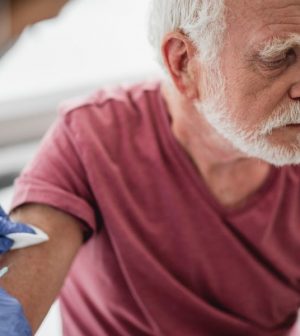- Recognizing the Signs of Hypothyroidism
- 10 Strategies to Overcome Insomnia
- Could Artificial Sweeteners Be Aging the Brain Faster?
- Techniques for Soothing Your Nervous System
- Does the Water in Your House Smell Funny? Here’s Why
- Can a Daily Dose of Apple Cider Vinegar Actually Aid Weight Loss?
- 6 Health Beverages That Can Actually Spike Your Blood Sugar
- Treatment Options for Social Anxiety Disorder
- Understanding the Connection Between Anxiety and Depression
- How Daily Prunes Can Influence Cholesterol and Inflammation
Have Allergies? See If You’re at Risk for Severe COVID Vaccine Reaction

Only certain people with high-risk allergy histories need to consult an allergist before they get a COVID-19 vaccine, according to new research.
Investigators have updated their prior guidelines after analyzing data from more than 65,000 people who were fully vaccinated.
“With more time and experience, we have been able to significantly narrow the group of patients with prior allergies who require an allergist assessment before COVID-19 vaccination,” said study co-author Dr. Kimberly Blumenthal, an allergist and drug allergy researcher at Massachusetts General Hospital.
“We now advise that only the rare individuals who have had a recent severe allergic reaction to polyethylene glycol, an ingredient in the vaccines, see an allergist or immunologist for evaluation, which may include skin testing,” Blumenthal said in a hospital news release.
People with severe allergies to foods, oral drugs, latex, bee stings or venom can safely receive the COVID-19 vaccines, according to the study. The results were published recently in the Journal of Allergy and Clinical Immunology: In Practice.
The findings apply to the Pfizer-BioNTech, Moderna and Johnson & Johnson/Janssen COVID-19 vaccines in use in the United States.
The researchers noted that severe allergic reactions to the vaccines are exceedingly rare. Still, they said vaccine clinics should continue to monitor higher-risk people for 30 minutes after vaccination. They should also have staff who are trained to recognize and manage allergic reactions.
The study authors also suggested changes in how patients with a history of allergies are evaluated before receiving a COVID-19 shot. This should include clear and simple questions to identify those eligible for all COVID-19 vaccines without requiring an allergist evaluation.
“Our main goal is to enable as many individuals as possible to receive a COVID-19 vaccine safely and avoid unnecessary vaccine hesitancy due to a lack of knowledge around allergic reactions to vaccines,” said study co-author Dr. Aleena Banerji, clinical director of the hospital’s Allergy and Clinical Immunology Unit.
More information
The U.S. Centers for Disease Control and Prevention has more on COVID-19 vaccines.
SOURCE: Massachusetts General Hospital, news release, April 19, 2021
Source: HealthDay
Copyright © 2026 HealthDay. All rights reserved.










